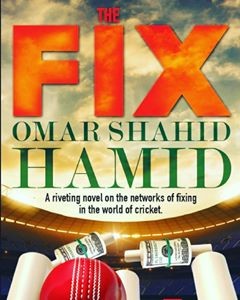

Dear All,
Karachi-based novelist Omar Shahid Hamid continues to churn out books at an enviable pace, and his fourth book in six years is unlikely to disappoint his fans as it’s as racy and pacy as his previous three.
Where his first book The Prisoner, a police thriller set in Karachi; his second The Spinner’s Tale, the story of a Karachi boy from an elite school turned international terrorist; and his third The Party Worker, a story about an urban-based ethnic party and an Altaf Hussain type figure, his new one The Fix deals with cricket and the match fixing mafia.
The Fix tells a story of corruption, venality, passion and betrayal. The central character is the captain of the Pakistan women’s cricket team, Sanam Khan, who along with her team is catapulted to celebrity after a spectacular performance in the Asia Cup. As the squad gear up as favourites in the forthcoming Women’s T20 tournament in England, they are approached and encircled by fixers and promoters and they learn of the dark and powerful underworld controlling international matches. The idealistic and committed Sanam is shocked by what she learns of fixers and bookies but even more shocking for her is the knowledge that so many of her cricketing heroes have links to this underworld and are themselves compromised.
The story unfolds at a time when Pakistan cricket is shown to still be under the dark shadow of a past match fixing scandal following an inexplicable World Cup final loss and a number of other unexpectedly poor performances. The scandal had cast doubt on the integrity of a number of superstars of the men’s team and had left fans feeling betrayed and dejected. This sense of betrayal is allayed slightly by the new optimism surrounding the gutsy women’s squad. However, the rather naive Sanam soon discovers that rather than just concentrate on their game, she and her players must fend off advances and entrapment from those who seek to profit from match fixing, and that there is no shortage within the sport of those who would become complicit.
The book is tightly plotted and has an array of interesting characters, in particular the compromised superstars of the past men’s team. Those youngsters had apparently betrayed the trust of their skipper Tariq Zaman (an Imran/Majid Khan like figure from an alternate reality) and co-operated with the bookies -- or had they? Questions and suspicions persist throughout the narrative, which a lot of cricket fans will love anyway because there is so much detail in there about matches and techniques and individual talent and personalities. The backdrop is the heart-wrenchingly, awful betrayal of Pakistani cricket lovers by their heroes, and the lingering sadness of this makes the story quite tragic in many ways, especially because, as in a Greek tragedy, a sense of inevitability prevails.
The Fix is actually a clever title for the book as it refers as much to match fixing as it does to addiction -- an addiction to easy money: money which is so easy to come by that players cannot seem to stop themselves from needing or wanting more and more. The vulgar wealth and excess of the crass but monied bookies is portrayed in the character of Rehan Jumani (Rehan Bhai or RB), who knows that the power of money reduces human beings to mere grovelling lackies, who fail to realise that they will never be free however much wealth they amass. It is a dirty situation about which one might wonder, in the words of the Lata song that is referenced in the book,‘Yeh Kahan Aa Gaye Hum?’
As usual, this is a cracking good read and a page-turner from this police officer-cum-novelist, however Hamid does seem to be increasingly taking his prose in the direction of the Harold Robbins genre so you should expect lots of expletives and cringeworthy sexual references. Given the sordid world it portrays this is not surprising but some of the sentences are memorably yuk -- such as, "Even as he tries to disengage from her lips, her tongue attacks his with renewed vigour".
Other than that a number of trivial questions have remained in my mind: was it such a good idea for Sanam to leave the door ajar? And whatever happened to the doner kebab she put in the oven?
But whatever my trivial queries, I have to say that this is an immensely readable book and a real eye opener: one that alerts you to the fact that mostly nothing is what it seems, and everyone has a price…
Best wishes,